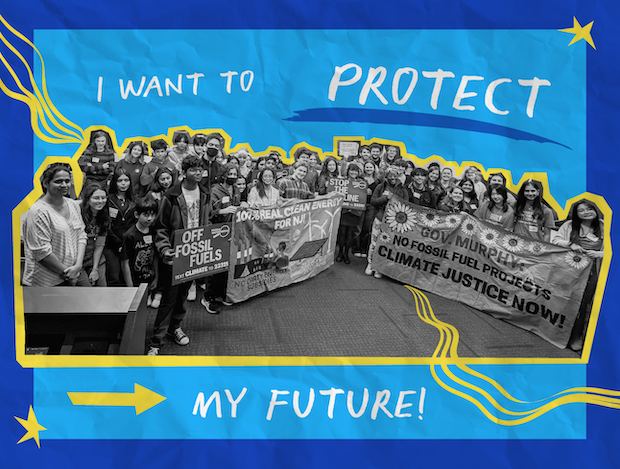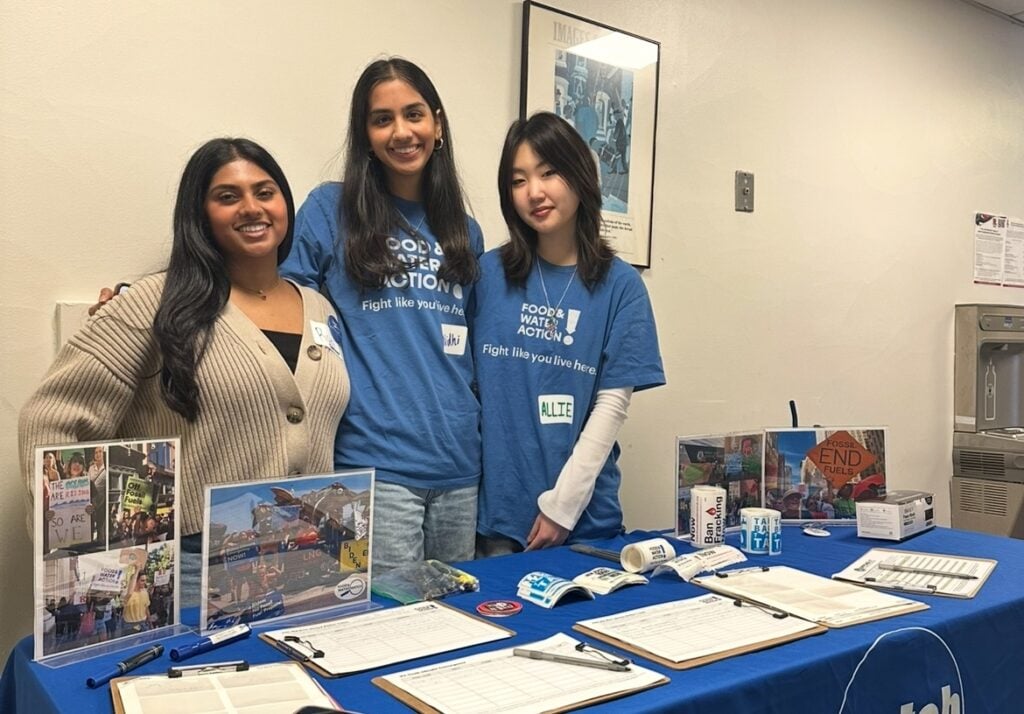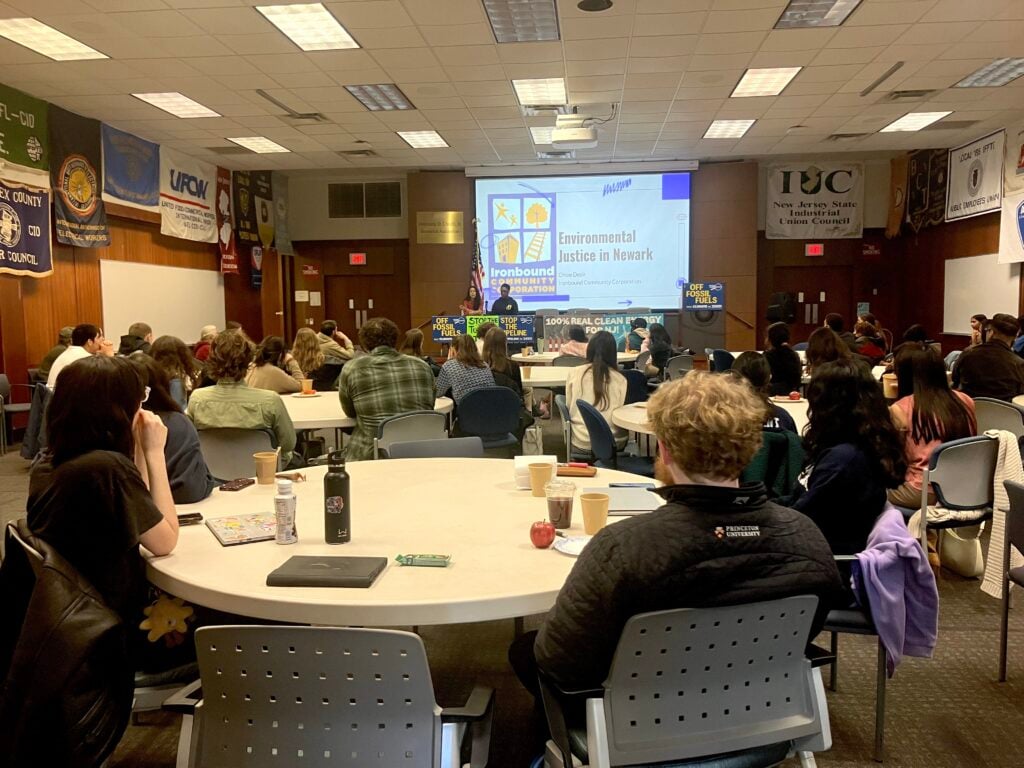The Young Activists of New Jersey’s Climate Justice Movement
Published Mar 28, 2025

Climate change is a growing threat to New Jerseyans, especially those already burdened by pollution. Young people are coming together to organize for bold action.
As someone in my late twenties, climate change has loomed large over most of my life. It drove me to study environmental policy in school and join Food & Water Watch after graduation. People of all ages are fighting tirelessly for a livable future, but I feel especially energized seeing people my age and younger taking their future into their own hands, organizing and wielding their power, and making incredible progress. So I was excited to see the New Jersey team’s recent Youth Climate Convergence in February.
The day-long event was entirely planned and led by Food & Water Watch interns in high school and college: Allie Park, Nidhi Karnik, and Tarani Nethagani. Through six months of organizing, they gathered 55 young people — from middle school to recent college grads — from across the state in a day of learning and connection. “I think this event will have helped restart the NJ Youth climate movement,” said Sam, Food & Water Watch Senior New Jersey Organizer.
Recently, I spoke with Allie, Nidhi, and Rani to talk about their journey planning the Convergence and their perspectives on climate justice.
They brought on guest speakers, planned the day’s agenda, and connected with student groups to organize and recruit for the event. They included a film screening, Q&As, a campus organizing training, and breakout groups on lobbying, storytelling, and campaign planning.
“I was inspired by the New Jersey Climate Action Gathering I went to at Rutgers last year,” said Allie. “There’s lots of youth who want to get involved — they just don’t know how to. So we wanted to facilitate a space where people could learn.”

Centering Climate and Environmental Justice
In New Jersey and across the U.S., the impacts of climate change go beyond disasters like hurricanes and droughts. The same polluters behind the climate emergency also emit air and water pollution that disproportionately harms Black, Brown, Indigenous, immigrant, and low-income communities.
For example, the majority-immigrant Ironbound neighborhood in Newark, NJ, sits among highways, a seaport that drives heavy truck traffic through the city, and an international airport.
“Then, on top of that, we have a very heavy industrial area that has been titled ‘Chemical Corridor,’” said Chloe Desir, a keynote speaker at the event and a policy analyst at the Ironbound Community Corporation (ICC). “It’s a place where we have three fossil fuel plants, the state’s largest garbage incinerator, and also a proposal of a fourth power plant as well.” All this pollution has led to higher asthma rates and other health issues in the Ironbound.
These dirty facilities also emit climate pollution, driving climate-fueled disasters like the floods that inundate the Ironbound with noxious waste.
For the climate and environmental justice movements, fighting climate change is directly tied to fighting for all communities’ right to good health and a safe environment, especially those harmed the most.
At the Youth Climate Convergence, organizers centered environmental justice with a screening of The Sacrifice Zone, a documentary on the Ironbound. The team also held a Q&A with Chloe and director Julie Winokur.
“New Jersey is often portrayed as a really progressive state, but so much more still needs to be done,” said Rani. “And it’s so close to home. The Ironbound is not that far from Rutgers. But unfortunately, it’s not something that most people are aware of, which is why a climate justice approach is so important — you really do take everything into account.”
Connecting Young Climate Activists from Across New Jersey
Allie, Rani, and Nidhi planned this event to bring together young people from across New Jersey. They connected with student groups like Kean University’s Environmental Alliance, the Piscataway Youth Progressive Organization, and Rutgers Students for Environmental Awareness.
Importantly, the organizers collaborated with student groups from the beginning, asking how the event could be most beneficial for their members. They approached Climate Revolution Action Network (CRAN) and asked how it wanted to be involved, which led to CRAN hosting its own legislative lobbying training. This was a great way to get other groups excited and encourage their own members to attend.
As a result, the event brought together students who might never have met otherwise. Different organizations learned from their different approaches; younger students and those new to organizing learned from older activists.
This was key for the organizers. “Change starts from a conversation,” said Allie. “It starts with learning from people who all have different perspectives, but all have a common goal of working toward a sustainable future.”
Moreover, Nidhi noted, “This event was not just a one-time thing. It sparked a sense of community and made youth want to continue to be involved in the climate justice movement.”
Attendees asked the organizers for more ways to get involved. People exchanged numbers and emails; they shared information about the groups, initiatives, and events they were a part of.
Food & Water Watch is fighting with frontline communities to protect our food, water, and climate. Find opportunities to join near you!
Turning Hope to Action for the Long-Haul
This all could not have come at a better time as federal actions and policies wreak havoc on our environment and democracy. Many attendees felt hopeless, including Ashleigh Krefski, a senior at Kean University. But, Ashleigh said, “After the Convergence, I was filled with so much more hope that we’re going to be okay. It was a room filled with people who all cared and all wanted to do something about it. It made me feel less alone.”
At the Convergence, Ashleigh learned how to testify in favor of the New Jersey Climate Superfund Act and attend the ICC’s advisory council meetings, which she now looks forward to.
“People came away feeling a little more prepared, learning something they can do locally,” Nidhi said. This is especially important considering that change is often slow, and local action sustains people for the long-haul.
Chloe noted that it took ten years for ICC to get New Jersey’s Environmental Justice law passed. This law mandates an environmental justice analysis for facilities proposed in overburdened neighborhoods, and it can stop them from being built. Passing it was a huge victory, and ICC is working to ensure the law is truly working to protect communities.
“It was also ten years of doing smaller things at the same time,” Chloe said, “Making sure we’re active and engaged.” For example, in 2023, ICC did truck counts in the community and found that in just six hours, 5,000 trucks passed through. These types of projects are key to showing the need for new laws and pushing for their passage, she said.

Working With Food & Water Watch Toward Change
Talking to Allie, Nidhi, and Rani reminded me that we all have unique skills that we can contribute to this movement. For instance, Allie, a filmmaker, presented on storytelling during the Convergence and is working on photojournalism and film projects to spread the message on climate and justice issues. The Convergence and the internship itself created a space for young people to learn from each other’s different perspectives and interests.
When we come together, learn from each other, and take collective action, we can make progress. In the past few years, Food & Water Watch has supported frontline communities in shutting down three polluting fossil fuel projects, and we’re organizing with the Ironbound to stop a fourth. With groups like the ICC, we’re also working to ensure the state’s clean energy incentives don’t go to polluting corporations.
And recently, New Jersey lawmakers introduced the Climate Superfund Act, which would require the biggest polluters to pay damages for their role in the climate emergency.
In the coming months, Allie, Nidhi, Rani, and the Food & Water Watch New Jersey team are working to pass this bill. It’s critical to prevent the rising costs of climate change from falling onto families. To start, the team is pushing for municipal resolutions in support of the bill to pressure state lawmakers to pass it. Already, more than 20 municipalities have supported it.
As the stakes for climate action rise higher, young people are rising to meet the challenge because they know what it means for their own lives, loved ones, and communities. “When it comes to climate justice and the climate crisis, these are happening in real-time, and they’re going to affect youth,” said Rani. “It’s really powerful to see youth step out and be like, ‘Hey, I want to protect my future.’”
Enjoyed this article?
Sign up for updates.
TO TOP


